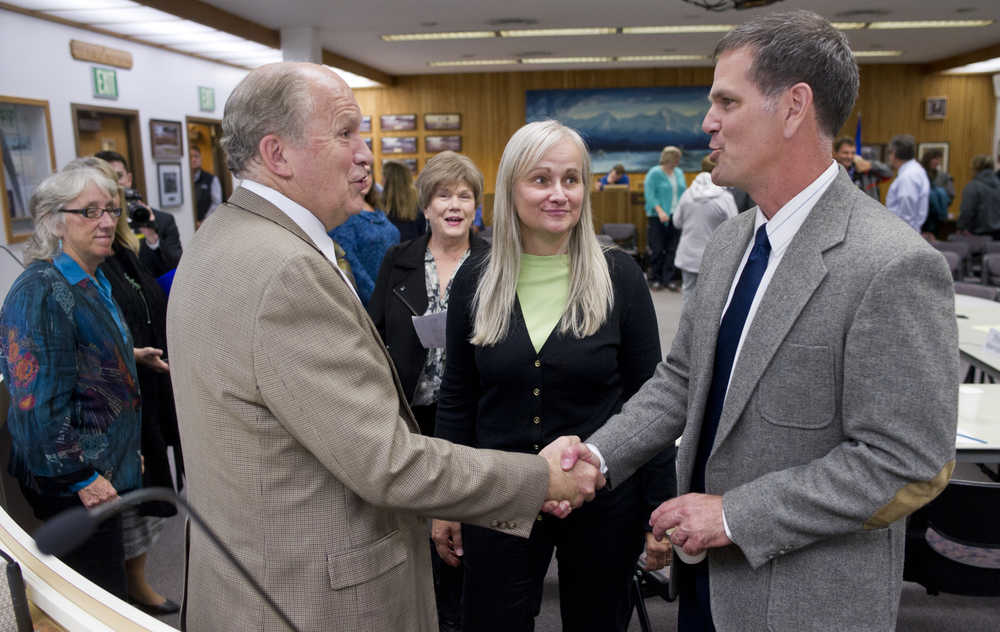During a special meeting Thursday afternoon, Gov. Bill Walker told the Juneau Assembly that he hopes never again to use his veto pen to the extent that he did during the past legislative session.
As welcome as that message was to the city’s governing body, several Assembly members still took the opportunity to grill the governor for one veto in particular that left a $3 million hole in the city’s budget.
“Deficits run downhill, and you’re downhill from the state Capitol,” Walker said, sympathizing from his time in city government. Before he served as mayor of Valdez in the late ‘70s and early ‘80s, he sat on its city council and served as its city attorney.
City government experience aside, Walker used his red pen to slash the state budget by about $1.3 billion in late June, an attempt, he said, to narrow the state’s $4 billion budget gap.
Those vetoes passed the buck — both literally and figuratively — to many municipalities across the state. Juneau was no exception. Days before the city’s balanced budget became effective, Walker’s vetoes left city officials staring down a $4.8 million deficit.
Roughly $3 million of the city’s newly bestowed budget gap came from Walker’s veto of more than $30 million from the state’s school debt reimbursement program.
On Thursday, several Assembly members pointed out that veto in particular impacted Juneau more heavily than other cities throughout the state.
“We feel it more than any other community, the deficit rolling down hill,” Assembly member Kate Troll told Walker. “It really piles up here.”
Troll also explained that all state government cuts hurt Juneau, more than other cities, given that many state government operations are based in Juneau.
Walker recognized that the school debt reimbursement veto weighed heavier on Juneau than other communities that might not have used the program to the same extent. But he said other vetoes impacted other communities more heavily.
“There is no equity in vetoes,” he said. “I’m aware of that.”
For instance, Walker also vetoed half of Alaskans’ Permanent Fund Dividend, cutting it to about $1,000. This, he said, will impact bush communities and places where groceries are more expensive than they are in bigger cities, such as Juneau.
Most importantly, though, Walker said that the failure of the Legislature to balance the budget forced his writing hand.
“The worst part of vetoes is there is no public process,” he said. “I don’t want to have to be in that situation again, and I’m going to make sure that I never have to be in that situation again.”
For Assembly members Jerry Nankervis and Debbie White, the school debt reimbursement veto was more than just passing the buck — it was breaking a contract.
“The biggest disappointment, as a locally elected official, is that contract wasn’t backed up,” Nankervis said, explaining that he is now worried that the state could renege on other obligations. “It is very difficult to have an obligation withdrawn.”
Walker is hopeful that won’t be the case. He said he will be holding several budget meeting in the coming weeks, and said he’ll be mindful of the school debt reimbursement program during these meetings. He also said his vetoes have already started to change the political landscape in the Alaska Legislature.
Walker wasn’t looking to point fingers. He said he and his peers can’t “blame our way out of this.” But he’s fine with taking blame if it means fixing the state, and his vetoes have labeled him the bad guy to some. He has told legislators that he will take all of the blame and give them all of the credit if it empowers them to make difficult decisions.
Walker has made similar visits to other city Assemblies throughout the state, including Anchorage, Homer and Mat-Su to get this message out.
“I’m not going to each community to apologize for what I’ve done,” he said. “If we don’t make some changes, these will be the good ol’ days — this year — by comparison.”
• Contact reporter Sam DeGrave at 523-2279 or sam.degrave@juneauempire.com.

